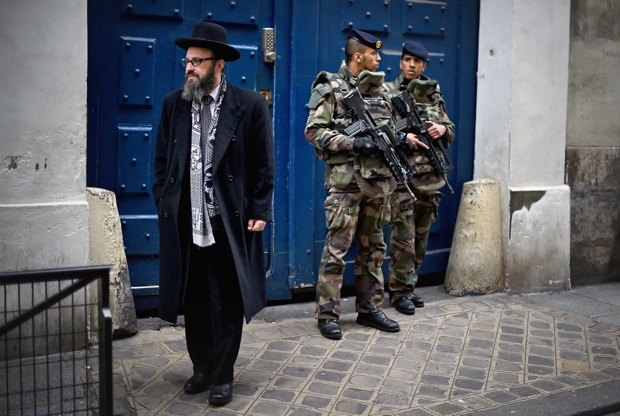A report in today’s Times suggests that French Jews are ready to discard their long-standing distrust for the Far Right and vote for the Front National. In January, Rachel Halliburton described how Marine Le Pen’s public condemnation of anti-Semitism had won her votes, as had her insistence that the party was the only one that defends secularity and democracy against Islamisation. A key part of her strategy has been to use the threat of radical Islam to court the sort of people that the far right has traditionally persecuted, including the gay community and the Jewish community.
That gay men now feel comfortable with the Front National is the result of a deliberate effort by its leader, Marine Le Pen, who has pursued a programme of detoxification (the French term is ‘de-diabolisation’) ever since she took control of the party in 2011. Her father, Jean Marie Le Pen, who led the FN from its founding in 1972 until Marine took over, described homosexuality as a ‘biological and social anomaly’. In the 1980s he argued that all individuals with Aids should be kept in isolation, and in the 1990s was still declaring that ‘There are no queens in the National Front.’
By contrast, Marine has worked hard to expand the FN’s membership beyond obvious bigots, racists and skinheads. She has publicly condemned anti-Semitism and insists that, far from being racist, her party is the only one that defends secularity and democracy against Islamisation. A key part of this strategy is using the Islamist threat to court the sort of people that the far right has traditionally persecuted. It’s working. In the 2012 presidential elections, Le Pen won 13.5 per cent of the Jewish vote. A surprising enough statistic, but her appeal to gay activists has created even more waves. Just before Christmas, her deputy Florian Philippot was outed as gay by Closer: the same magazine that exposed Hollande’s affair with Julie Gayet. Around the same time, Le Pen appointed a new adviser: Sébastien Chenu, one of the founders of the activist organisation GayLib. FN traditionalists complained loudly that their party was being taken over by a gay cabal. (Those complaining included Marine’s 25-year-old niece, Marion Maréchal-Le Pen, an MP and a rising star in the party.)
What, beyond support against the threat of Islamic fundamentalists, does Marine Le Pen’s FN claim to offer to a gay political activist? Officially Le Pen does not support the legalisation of gay marriage, which the French government passed last year. But like other far right leaders in Europe, notably Geert Wilders of Holland’s Freedom party, she sees the value of the gay vote. When huge demonstrations were held against gay marriage in Paris in 2013, she refused to take part. She seems able to walk the conceptual tightrope between what her party’s old membership wants and what its potential members need to hear. Her response to the outing of Philipott was to attack Closer and change the subject: ‘Florian Philippot is entitled to a private life as much as François Hollande,’ she said.
Switching attention back to the hapless president was a shrewd move. Hollande’s dismal popularity ratings (at the end of last year they sank to 12 per cent, the lowest recorded score for a sitting president) also contribute to the Front National’s success. Although Hollande pushed through the legalisation of gay marriage last year, many left-wing gay voters were disappointed that he failed to give the bill his personal support until the last minute. The centre-right UMP, meanwhile, issued a legal challenge the moment the bill had been approved by vote. Even critics such as Lestrade recognise that the FN offers more to ambitious young gay political activists than the more mainstream parties. ‘I think if you are gay, you’re going to make a difference there in a way you won’t get a chance to in the Socialist party or the UMP,’ he says.
Bruno Clavet is an out and proud gay activist for the FN. A politics graduate and a former underwear model, he tells me that when he was 18 he worked for Nicolas Sarkozy during the 2007 presidential election, but switched to the FN just before the most recent one. I ask him if it troubles him that his party has a strong anti-gay past. ‘I don’t think the FN is anti-gay,’ he replies. ‘We are against ghettoisation [into racial or sexual communities]. For me there is only one community, it’s the national community — the French people.’ This is the new spirit of French nationalism, one that resonates loudly in the aftermath of the Charlie Hebdo attack.
The era of stable government is over
 Join us on 23 March for a Spectator discussion on whether the era of stable government is over with Matthew Parris, James Forsyth, Jeremy Browne MP, Vernon Bogdanor and Matthew Goodwin. The event will be chaired by Andrew Neil. In association with Seven Investment Management. For tickets and further information click here.
Join us on 23 March for a Spectator discussion on whether the era of stable government is over with Matthew Parris, James Forsyth, Jeremy Browne MP, Vernon Bogdanor and Matthew Goodwin. The event will be chaired by Andrew Neil. In association with Seven Investment Management. For tickets and further information click here.






Comments